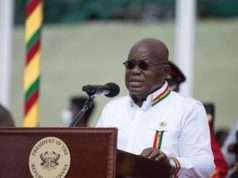President Nana Addo Dankwa Akufo-Addo has announced that the Ministry of Education is in talks with the Ghana Education Trust Fund (GETFund) to seek funding for massive infrastructural projects in various tertiary institutions in the country.
The move, President Akufo-Addo explained, is to accommodate the large number of students who will be entering the universities and other tertiary institutions following the Free Senior High School (SHS) policy.
Students who benefitted from the free SHS initiative when it first began are expected to gain university admission in September this year, if the calendar is not affected the coronavirus pandemic.
Speaking at the Jubilee House in Accra, President Akufo-Addo reiterated that special funding is being arranged for expansion works at the various tertiary institutions.
“The Ministry is currently negotiating a special funding under the GETFund for dealing with infrastructural matters in all the universities of the country because of the larger intake of students that are going to come out of the Free SHS school system. So the special funding is almost complete and it is intended to address the capacity issues that there are in the various universities,” President Akufo-Addo stated.
The free SHS education policy is the most significant social intervention introduced in the country since independence.
The Akufo-Addo administration saw it as the best way a government could invest and build the capacity of students for the future of the country.
The Government implemented the free SHS programme in September 2017, in fulfilment of a major campaign promise in the lead up to the 2016 general election.
However, there have been some challenges with classrooms and residential accommodation since the programme took off, forcing the government to subsequently introduce a temporal double-track system.
With this temporal arrangement, the students are divided into two batches with alternating school terms.
Enrolment up
Since the free SHS, parents and all well-meaning Ghanaians would attest to the fact that the policy was a good and viable one.
Three years into the policy, enrolment in SHSs is reported to have increased to about 69 per cent.
In response to the increase in numbers, the double-track system was introduced as a temporary solution to the growing numbers, while the provision of infrastructure continued.
Ending double track
Government is currently investing in the construction of new infrastructural facilities in SHSs across the country towards ending the double-track system.
The expansion of the infrastructure in all public academic institutions, particularly in SHSs, is to improve access and reduce congestion in the classrooms.
Accordingly, the double-track system is expected to be over in just a few years in all schools when the infrastructure is completed.
This will enable the schools to revert to the single-track system.









































